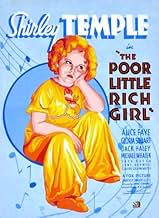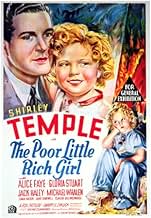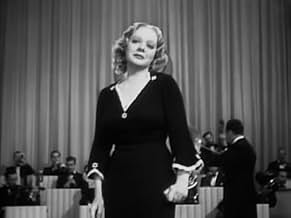Ajouter une intrigue dans votre langueThe daughter of a wealthy businessman becomes lost in the city while traveling to a new school, and is taken in by a pair of down-on-their-luck performers.The daughter of a wealthy businessman becomes lost in the city while traveling to a new school, and is taken in by a pair of down-on-their-luck performers.The daughter of a wealthy businessman becomes lost in the city while traveling to a new school, and is taken in by a pair of down-on-their-luck performers.
- Réalisation
- Scénario
- Casting principal
- Récompenses
- 2 victoires au total
- Policeman
- (non crédité)
- Radio Station Receptionist
- (non crédité)
- Waiter
- (non crédité)
Avis à la une
When her nanny is struck in a hit-and-run at the train station, little Barbara strikes on her own to meet friends. After spending a day with an Italian organ grinder and his colorful family, Barbara joins up with Jack Haley and Alice Faye as down-on-their-luck married singers Dolan and Dolan. Adopting the identity of her favorite book character, Barbara tells the Dolans that she is runaway orphan Betsy Weer. Soon she is given another alias: Pretending to be the Dolan daughter, Bonny Dolan, Barbara turns their failing act around, and the trio is hired to advertise for the Peck Soap Company, the arch rival of Barbara's father's soap brand.
As Bonny, Barbara wins the hearts of all her audiences, until her father hears her voice singing on the radio. Mr. Barry finds his daughter just in time to save her from a mysterious stalker who has been following the young girl around throughout the entire movie, always accompanied by eerie orchestral music. In one scene, he peers through a window and watches Barbara sleeping, and in another, he tries to lure her away with the promise to buy her candy. What's even more disturbing is that the movie never says exactly what this creep wants with Barbara. The fate of Barbara's nanny is never revealed either; she is simply whisked away to a hospital after the car collision and is not seen or mentioned again.
Despite these two loose ends, Poor Little Rich Girl is a perfect example of the standard Temple story. All ingredients for a Shirley smash are here: long tap-dance numbers (Shirley's dance-off with Jack Haley will knock your socks off), lots of cute songs (particularly enjoyable are "Oh My Goodness" and "You've Gotta Eat Your Spinach, Baby"), a cranky curmudgeon who warms his heart to Shirley (in "Poor Little Rich Girl," it's Mr. Peck, but see Ned Smith in "Bright Eyes," Colonel Lloyd in "The Little Colonel," or Lord Wickham in "The Little Princess," for other examples), and a happy ending. Her story lines may seem trite and repetitive now, but they were what the nation wanted to see in the 1930s, when Shirley Temple was one of the biggest stars in the world and a guaranteed box office smash. Shirley was obviously enjoying the height of fame at the time of this movie, as one song, "But Definitely," makes a reference to two of her most famous songs, "The Good Ship Lollipop" and "Animal Crackers in My Soup."
The performances are right up there. One of my favourite screen stars Alice Faye is so brilliant, she never gets lost in Temple's glare as do so many of her costars. Jack Haley is hilarious, and the songs are amazing. Alas, Gloria Stuart isn't given much to do but she looks wonderful.
Favourite moments include the spaghetti-eating scene, Shirley's conversation with the curb-side porter and of course "You Gotta Eat Your Spinach Baby." Fine film for parents to watch with their kids.
Try to get the original black and white version if you can, the colorized version looks a little weird.
Of all the show biz stories associated with Temple's films, this is one of the best. The story has Temple as the neglected daughter of MICHAEL WHALEN, skipping off after her nanny is involved in an auto accident and attracting the attention of entertainers Faye and Haley. A sub-plot has her father winning the love of the lovely GLORIA STUART--and, of course, the outcome is a predictable one when he is reunited with his missing daughter after hearing her perform on a radio show.
The slender plot serves mainly as a vehicle for Temple to be adored by her legion of fans. She doesn't disappoint, her winning ways fully exploited in either song or dance. In fact, this is probably one of her most charming song-and-dance performances.
Alice Faye, Jack Haley, Michael Whalen, Gloria Stuart, Billy Gilbert and Henry Armetta add to the enjoyment. All of it is directed in fine style by Irving Cummings (who also served as host on the Lux Radio Theater shows) so popular on radio.
Henry Armetta has a funny bit as an organ grinder with a monkey who has Shirley enjoy an Italian spaghetti dinner with his family. The only serious moments in the film involve, surprisingly, a stalker who seems to be lurking in doorways waiting for an opportunity to snatch Shirley off the streets. Fortunately, she survives for a happy ending and the stalking incident, while sinister enough, is given minor treatment in the story.
Summing up: Good family entertainment.
Le saviez-vous
- AnecdotesThe precision tap dance performed by Jack Haley, Alice Faye and Shirley Temple required endless takes. Although Haley, Faye and Temple were all excellent tap dancers, they found it extremely difficult to stay in sync for such a long and complicated number.
- GaffesIn the end credits, actress Sara Haden's first name is misspelled as "Sarah."
- Citations
Stebbins: That's the third sneeze.
Collins: I'm afraid you'll have to go to bed.
Barbara Barry: But I'm not sick. I feel fine!
Woodward: Oh, Collins, she's perfectly well. A sneeze is nothing to be alarmed at.
Collins: Maybe so, But I'm responsible for the child. Come along, dear.
Woodward: The child sneezes, and you'd think the world has come to an end. Why can't they leave her alone? She's a perfectly normal, healthy child. The way they carried on here, you'd think she was made of glass! Something ought to be done.
Collins: How Mr. Barry can stand that woman is beyond me.
Woodward: You can't expect a widower and a man as busy as Mr. Barry to notice everything that goes on in the house.
- ConnexionsFeatured in Biography: Darryl F. Zanuck: 20th Century Filmmaker (1995)
- Bandes originalesWhen I'm with You
(1936) (uncredited)
Music by Harry Revel
Lyrics by Mack Gordon
Played during the opening credits
Sung by Tony Martin
Later Sung by Shirley Temple
Finally Sung by Alice Faye
Meilleurs choix
- How long is Poor Little Rich Girl?Alimenté par Alexa
Détails
- Durée
- 1h 19min(79 min)
- Couleur
- Rapport de forme
- 1.37 : 1







































